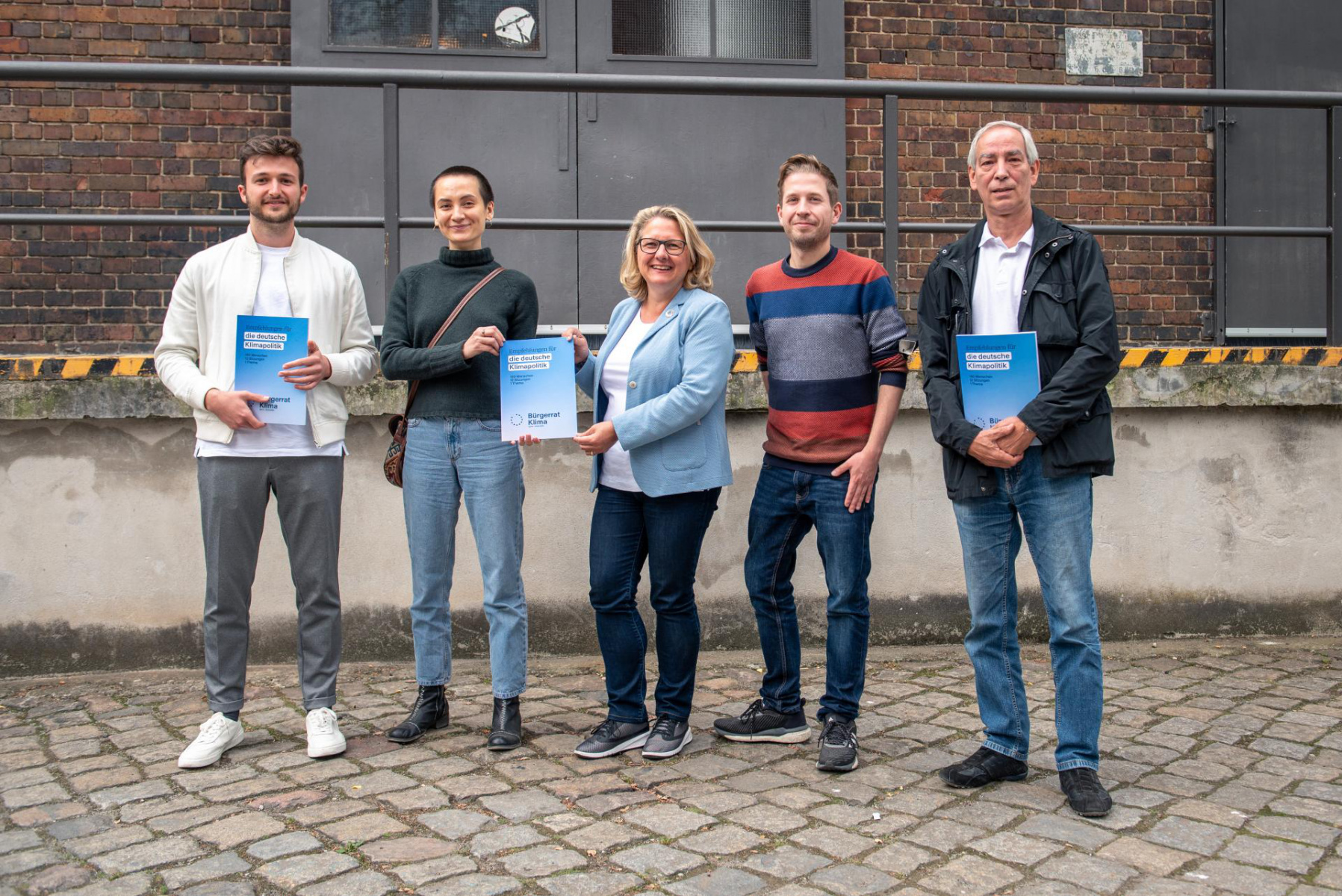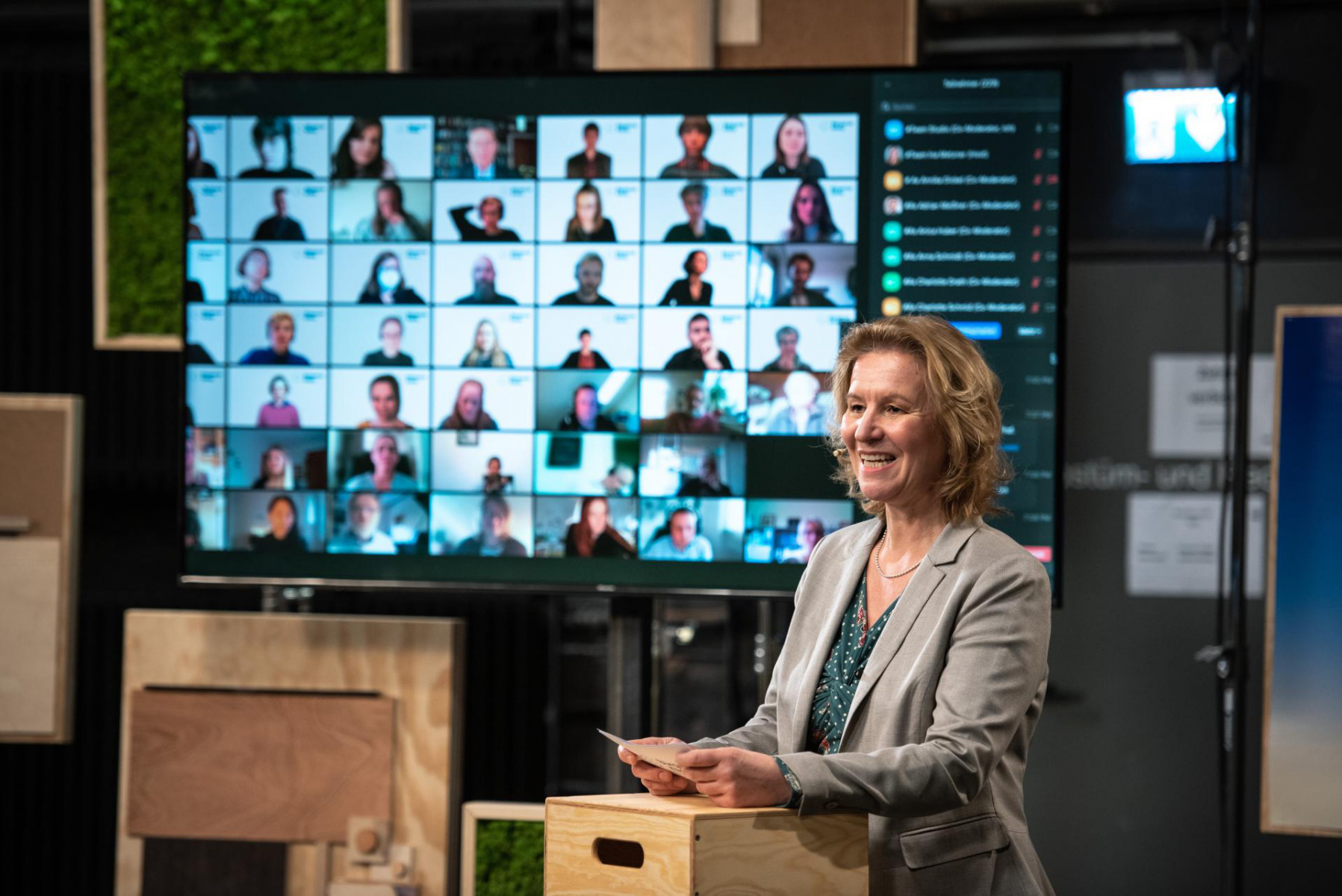We have grown used to the idea that an important role of politicians is (or should be) to help and support citizens, not the other way around. But the rise of citizens’ assemblies over the last few years shows that it can work both ways: the help of citizens can be of vital importance to politicians. Especially when it comes to the toughest and most complex problems of our time: climate change. In Germany a group of citizens has set out to do just that. They offered to help the next government to reach the Paris’ climate agreement goals. We spoke to Gabriel Pelloquin, Political Communications Officer at the non-profit organisation BürgerBegehren Klimaschutz, which organised a climate assembly in Germany. Separately we talked to Sabine Schröder, head of the Unit Infrastructure and Society of facilitating organization nexus, which carried out the assembly with two other institutions (ifok and IGP). In this article we combine these two interviews to come to a better understanding of the German climate assembly.
This interview is part of the international project Climate Citizens’ Assemblies: Learning With, From and For Europe. Through various interviews, European key players share practices and their reflections on Climate Citizens’ Assemblies. Curious about the results of this exploration? Check out our online publication for the outcomes of the project.
The German Climate Assembly was not initiated by the government, but by a group of citizens. How did this come about?
“To answer this we have to go back in history a bit,” Gabriel Pelloquin says. “In 2019 Germany held its first national Citizens’ Assembly on the topic of democracy: the ‘Bürgerrat Demokratie’. The project was such a success that the German parliament, the Bundestag, decided to commission another citizens’ assembly. A list of topics was composed, amongst them the issue of the global climate crisis, but also many others.” In 2021 the Bundestag decided to have a Citizens’ Assembly on the topic of ‘Germany’s role in the world’. However, it was clear that the topic of climate change could make for an important citizens’ assembly as well. “Climate protection is a political topic with growing urgency and relevance,” Sabine Schröder of nexus explains. “Therefore, finding out about citizens’ views on this topic could prove to be very relevant to politicians.”
Already in December 2020, Scientists for Future had published a statement expressing the urgency to act now. In this statement they advocated for a randomly selected Climate Citizens’ Assembly to be held before the end of 2021. Consequently, over a hundred civil society organizations came together in support of a Climate Assembly, among those BürgerBegehren Klimaschutz, which started an initiative to fund the project. As it was a year before the next elections, the idea raised to organise a Climate Assembly beforehand, so that the outcome would present the new government with the citizens’ views on climate policy.
The strategic decision to organise the assembly before the next elections in September 2021, meant there was little time: within a few months the assembly had to be designed, prepared and executed. An independent organisation, or group of organisations, was needed to set up and facilitate the whole process. This was the moment when nexus stepped in, an organisation with over twenty years of experience with various participation methods. Among them citizens’ assemblies: together with Mehr Demokratie and ifok it organized and executed the first German citizens’ assembly in 2019. This time they cooperated with other organisations as well, Sabine Schröder clarifies: “Together with the participation institutes ifok and IPG we are responsible for the entire process: the random selection of participants, facilitation the agenda setting together with the scientific board, moderating and facilitating the sessions, managing the discussions – everything related to the process.”
Climate protection is a political topic with growing urgency and relevance. Finding out about citizens’ views on this topic could prove to be very relevant to politicians.
This project was initiated by grassroots organisations and without any political promises or a mandate. What was its goal?
“Nonetheless, to get it into politics”, Gabriel Pelloquin says. “In our communications we are clear on the fact that this climate assembly is an offer to politics. We are not saying to politicians: ‘you must do this’, but we explain that citizen participation is currently lacking in the development of climate policy. The next legislative period – that means the next four years – is going to be decisive in German climate-politics. That is why we need this now. This does not mean that the Climate Assembly will be presenting a comprehensive strategy for the next government, or something politicians should copy one on one; it is an insight into what the people think should be done, accompanied by a set of recommendations.
When it comes to political mandate, we would be happy if the next Bundestag decided to continue with citizens’ assemblies. Some parties are already advocating for this, and refer to it in their election programmes. Chances are that citizens’ assemblies will continue to be organised. So we are not acting against politics, but really trying to help out. Show what citizens recommend and what concrete policies they would like to see implemented in politics regarding climate protection. That is the main drive of the project.”
We are not acting against politics, but trying to help out.
Are you not afraid that all the hard work could be in vain?
“It depends,” Gabriel Pelloquin responds, “there is always a risk, but the offer that we as citizens are making is very good. The German government committed to the Paris climate agreement, but we are not on track to reach those goals. While the climate assembly was taking place this spring, the federal constitutional court came to the conclusion that the current German Climate Law is not tough enough and is lacking concrete measures for implementation. Therefore, the next government is facing an enormous challenge when it comes to climate policy. That is why the Climate Assembly is such a good offer. Basically, we are saying to politicians: ‘We are organizing this assembly for you, because you are going to have to make climate policy and that is not going to be easy.’”
The large group of civil organizations that BürgerBegehren Klimaschutz brought together is another reason why the outcome will be difficult to sweep aside by politics. This group supports the assembly and plays an important role in communicating the outcome to the rest of society. Additionally, an advisory committee consisting of twenty members from various fields of civil society is asked to oversee the process and to spread the results into their networks as well. Both the pathways will make the public support for the assembly visible, which will help politicians to act on the outcome. However, this will need some additional discussions with politicians as well, in order to inform them on the assembly, showing them that it has been properly and independently organised. “Of course there will be talks with different politicians and parties before the elections”, Sabine Schröder says, “but also after the elections, when the new government has taken place. These meetings will introduce the results to the newly elected parties.”
Also, there is an esteemed political force which adds to all this: the former German Federal President (Bundespräsident) Horst Köhler has agreed to be spokesperson and leading figure of the assembly, which may convince politicians even more of the assembly’s credibility.

© Übergabe des Bürgergutachtens an SPD, v.l.n.r. Noah Spieker, Alexandra North, Svenja Schulze, Kevin Kühnert, Andrej Springer, Schöneberger Südgelände, 25.08.2021
However, not only politicians need to take the outcome seriously, in order for a citizens’ assembly to have impact. The rest of society needs to consider the outcome to be legitimate as well. “If you want the process to be successful you need a lot of public attention,” Gabriel Pelloquin explains. “The format of a citizens’ assembly is quite new to a lot of people. So first of all, awareness needs to be increased. People need to know what it is, and why it is such a valuable tool for democracy and politics. It is fascinating to see what happens when you bring together a group of randomly selected citizens and let them decide on what is to be done. Everyone should be able to witness that process.”
If you want the process to be successful you need a lot of public attention.
The Climate Assembly recently presented its recommendations; the process seems to have gone very well. Were there any difficulties? What can other countries learn from the German example?
“There are always difficulties,” Sabine Schröder says. “One of the problems of not having a political mandate, is that it makes it more difficult to organise the random selection, because you need the official registration offices for that. As we were unable ask the registration offices to organise the random selection, we had to find another solution: we hired a company to randomly call 15.000 people. About two thousand people indicated they were interested to take part; they received an email with more information and the request to fill out a questionnaire. From these two thousand people, six hundred actually registered and provided us with the data we needed for the stratified sampling: their age, gender, level of education, where in Germany they live, whether they have a background in migration, and their attitude towards climate protection.”
Gabriel Pelloquin agrees the process of a climate assembly should have come from politics. “Also because of the costs involved. However, having a political mandate is not going to solve everything by default. As for instance we have seen in France, even a strong political mandate does not guarantee that politicians will act upon the outcome. That’s why you need to convince people of the value of this format. Also, it is too important a topic to wait for the next government to maybe organise a climate assembly in a year or two.
Finding participants with lower levels of education proved to be another complexity. “This is something most citizens assemblies have trouble with,” Sabine Schröder explains. “People with lower levels of education are often underrepresented, because they are less likely to respond to the invitation. And of course, it is difficult to communicate information about a complex topic in a way that is understandable for people with very different backgrounds, levels of knowledge, education, and so forth. We tried to solve this by preparing written and oral briefings on all the expert presentations, and checking if everything the experts told was understandable for everyone. We developed some criteria for the expert information, for example a consistent story line, no foreign or scientific terms, no complex graphs. We also created a platform for all the participants where they could find all the information on the process, the links to the video conferences, a library with further information, and chats and videos of the expert presentations. Nonetheless, getting the information across in a manner understandable for everyone is a difficulty of every assembly which has to be further discussed and improved for the future.”

© Moderatorin Christiane Dienel und Teilnehmende, 1. Sitzung, 26.04.2021
The broad scope of climate change is an absolute difficulty as well. Where to put the focus, what aspects should be discussed and how thoroughly can they be discussed? “As the discussions unfold, the participants want to dive deeper into to topic,” says Sabine Schröder, “but unfortunately it is impossible to discuss everything in detail and design a whole political program in the given time. Enough time to discuss is always a challenge, therefore we decided on the foci of the assembly together with a scientific board.”
Having a political mandate is not going to solve every problem by default.
What are your aspirations for the future?
“It is not about us, but about the 160 citizens that put this much time into this assembly,” Gabriel Pelloquin responds. “The hope of BürgerBegehren Klimaschutz is that the Climate Citizens’ Assembly receives proper attention and that the hard work of the participants is rewarded. It would be a good thing if the government continues with citizens’ assemblies. They could organise citizens’ assemblies on a regional level, which I think is going to be necessary. As soon as topics have local impact, discussions change. You can see this in the energy transition and the classic ‘not in my backyard’-response it incites. There is a lot of potential in involving citizens in decision making on this subject. People are willing to go much further when they are involved and provided with balanced information from different view-points, rather than when they are confronted with something the government decided.”
And what about nexus? “As nexus institute our aspiration is to have proper participatory processes which integrate citizens’ views into planning and decision making,” Sabine Schröder says. “In the end, we would also like to foster further institutionalization of participatory processes. To have a mandate that makes participation legally binding. That is why I think it is a very good development that there are so many citizens’ assemblies being organised on different levels throughout the country. Another aspiration is to create more common understanding of what a Citizens’ Assembly is. It would be good to have some collective criteria for citizens’ assemblies, because now it is being used as a buzzword for quite different processes. And, of course, for this climate assembly our hope is very much that the new government will take the citizens’ recommendations seriously, discuss them, and put them into practice.”
People are willing to go much further when they are involved in the process, than when they are confronted with something the government decided.
Do you want to know more on Climate Citizens’ Assemblies in Europe? Have a look at our online publication for the outcomes of the project, and check out our dossier page for more articles, videos and podcasts on European case studies.









